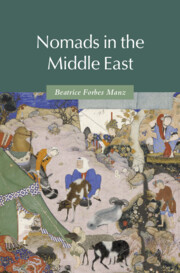Book contents
- Nomads in the Middle East
- Series page
- Nomads in the Middle East
- Copyright page
- Dedication
- Additional material
- Contents
- Figures and Maps
- Preface
- Maps
- Debate between Sheep and Grain
- 1 Introduction
- 2 Nomads in the Establishment of the Caliphate
- 3 The Rise of New Peoples and Dynasties
- 4 Turkic Tradition and Seljuqid Rule
- 5 Mongol Conquest and Rule
- 6 After the Mongols: Timurids, Turkmen and Ottomans
- 7 The Rise of Nomad Tribes,1500–1800
- 8 Nomads in the Modern Middle East
- 9 Conclusion
- Bibliography
- Index
2 - Nomads in the Establishment of the Caliphate
Published online by Cambridge University Press: 12 November 2021
- Nomads in the Middle East
- Series page
- Nomads in the Middle East
- Copyright page
- Dedication
- Additional material
- Contents
- Figures and Maps
- Preface
- Maps
- Debate between Sheep and Grain
- 1 Introduction
- 2 Nomads in the Establishment of the Caliphate
- 3 The Rise of New Peoples and Dynasties
- 4 Turkic Tradition and Seljuqid Rule
- 5 Mongol Conquest and Rule
- 6 After the Mongols: Timurids, Turkmen and Ottomans
- 7 The Rise of Nomad Tribes,1500–1800
- 8 Nomads in the Modern Middle East
- 9 Conclusion
- Bibliography
- Index
Summary
The chapter describes the population and economy of the Arabian Peninsula, a mix of sedentary population, sheep and goat nomads, and camel nomads. All were included in a strong tribal system. Before the rise of Muhammad, the Peninsula and Syrian desert were brought into the politics of the Sassanian and Roman Empires, which patronized client kingdoms of nomad tribes, thus bringing the nomads into the broader political field. The chapter surveys the role of nomads during the lifetime of Muhammad and the conquests; the conquest army was not organized tribally, but the early caliphs used tribal structures for administrative and cultural purposes. The chapter argues that the Umayyad dynasty (661–750) included nomads within the state, but increased control over tribal leadership. At the same time, the Umayyad court patronized pre-Islamic poetry glorifying the tribe and Bedouin lifestyle to create a separate Arab identity.
Keywords
- Type
- Chapter
- Information
- Nomads in the Middle East , pp. 28 - 54Publisher: Cambridge University PressPrint publication year: 2021

